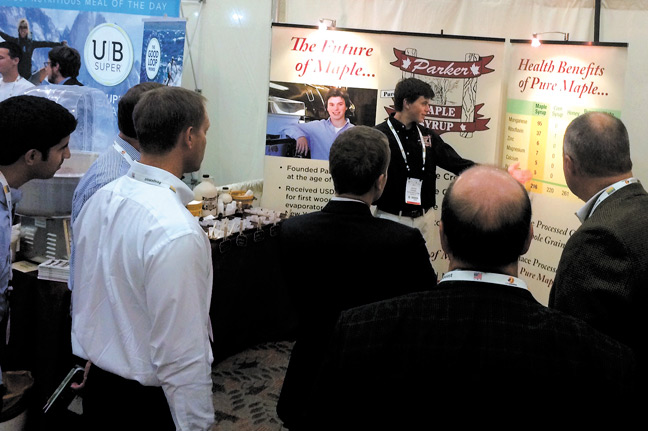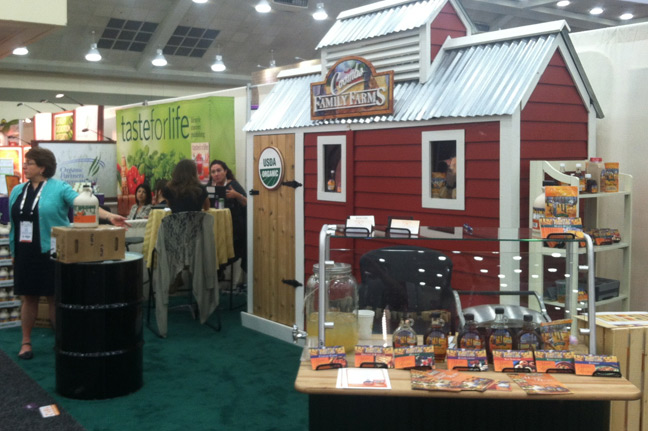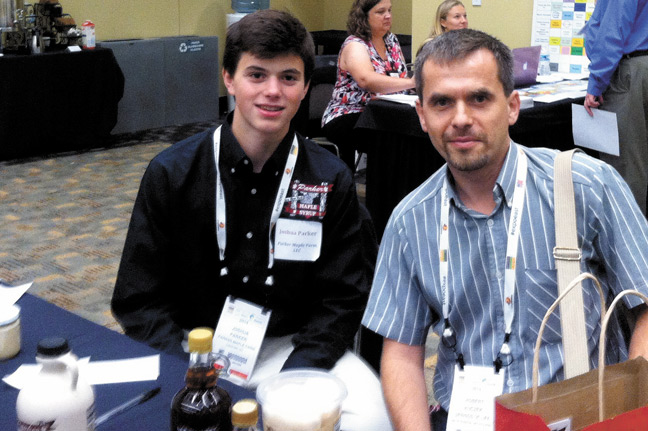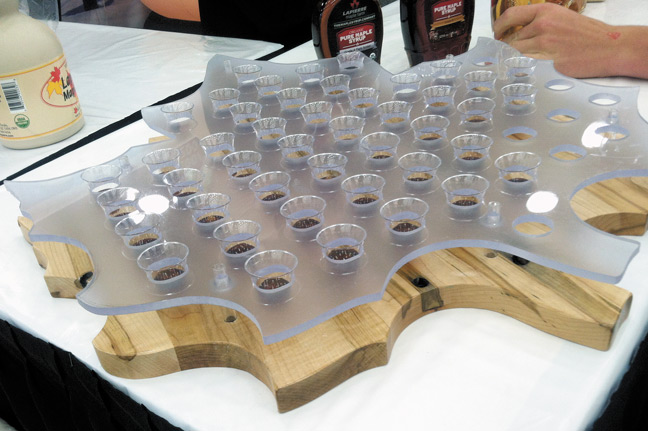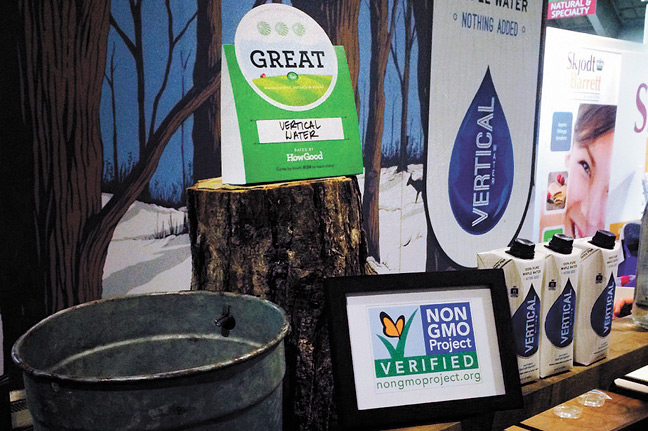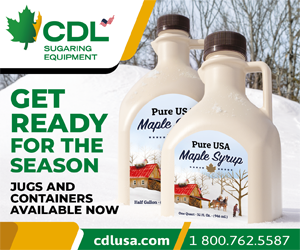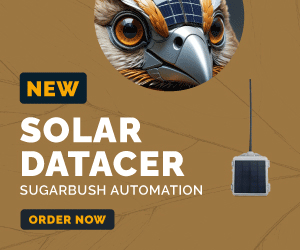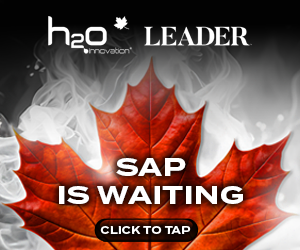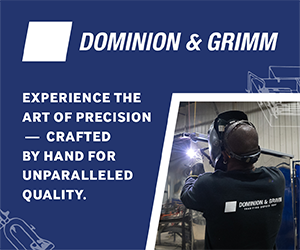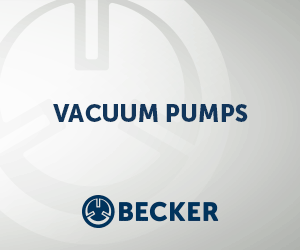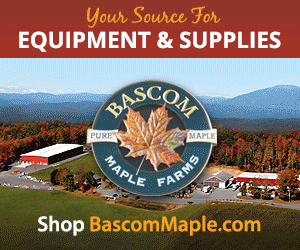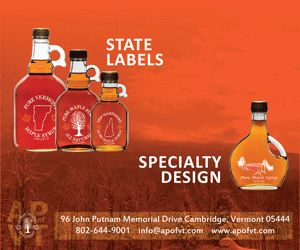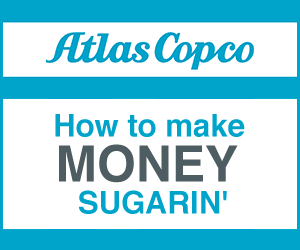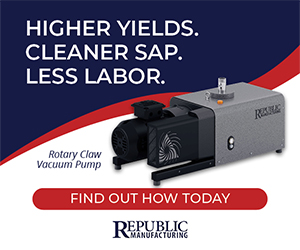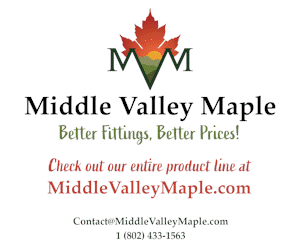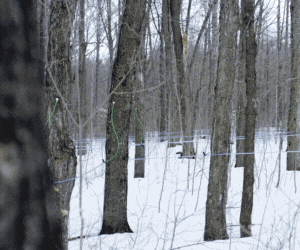Cornell Corner
Highlights from 2014 Natural Products EXPO East
10 takeaways from my time at the expo
By BY MICHAEL L. FARRELL |
This September I had the fortunate opportunity to attend Natural Products EXPO East, one of the largest trade shows in the country focused on natural foods and related items. I made the trip down to Baltimore with Joshua Parker and his step-mother Jen from Canton, NY. I first met Joshua when he attended Cornell Maple Camp last year at the age of 15. He wanted to take his small hobby operation to the next level and he has certainly followed through with his ambitious goals. In 2014, Joshua increased his operation to 3,000 taps and made over 1,100 gallons of syrup. Knowing that markets were fairly saturated in his hometown, Joshua wanted to explore national and international markets for his syrup. He contacted an organization called Food Export USA that helped set up meetings with ten foreign buyers on the day before the show opened and paid for nearly half of all the expenses to attend the EXPO and set up the booth.
I told Joshua to go in to the EXPO with high expectations and he was not disappointed. We spent three days telling his story to hundreds of potential clients and developed many leads for future sales. There were plenty of folks who walked by the booth without bothering to stop, but for those that did take the time to talk to us and taste some pure maple products, the outcomes were remarkable. Of course everyone was impressed with Joshua’s ambition and maturity at such a young age. Most people had a hard time believing that it was actually Joshua who started and owned the business, but once they heard the story behind it and got a chance to taste some of the pure maple products, they were hooked. He now has well over a hundred promising connections to natural food stores, food processors, brokers, distributors, and other folks involved in the natural and organic food industry. The remainder of this article includes ten takeaway lessons and highlights from my time at the Natural Products EXPO East with Joshua and Jen.
1. Showing up is half the battle
At EXPO East, there were only four purveyors of pure maple syrup. It is a huge show with roughly 25,000 attendees and 1,400 exhibitors. As you can imagine, with only four maple booths, it is possible that you could walk through the show and not really get a chance to interact with one of the maple vendors. All four vendors who were there made a lot of new syrup deals over the show, and if there were more maple vendors, then there would have been even more deals made. Although the four maple vendors were competing with one another to a certain extent, the real competition was elsewhere. In the greater marketplace, pure maple competes with cane sugar, beet sugar, and high fructose corn syrup as a sweetener. In the natural foods channels, it is also competing heavily with organic cane sugar, agave, honey, stevia, coconut sugar, and many other “natural” sweeteners. At EXPO East there were thousands of people there who use natural and organic sweeteners for processing in items such as granola, cereals, popcorn, yogurt, ice cream, energy bars, beverages, and so on. The more we can put pure maple in front of them, the more it will wind up in these items. While it’s not realistic for the vast majority of maple producers to attend a large trade show such as EXPO East, it’s certainly worth looking in to smaller local and regional trade shows to promote your maple products. Just getting out there and promoting pure maple is half the battle.
2. Offer additional products besides pure maple syrup
Most grocery stores and natural food outlets already carry pure maple syrup- it doesn’t do the industry any good to simply replace someone else’s syrup with your own on a store shelf, and retailers are unlikely to switch suppliers unless there is a problem with their current one. However, if a retailer is willing to carry your syrup in addition to other brands, that is another story. The more shelf space pure maple occupies on the grocery aisles, the more syrup we will sell as an industry. While Joshua certainly made connections with people who didn’t already carry pure maple in their offerings, it was much more common that someone already had pure maple syrup. They didn’t want another brand of pure maple, but they were interested in related products. Thus, in addition to pure maple in a variety of plastic and glass containers, Joshua was also offering maple sugar, maple cream, maple candies, maple cotton candy, and birch syrup. Maple cotton candy and maple cream generated the most interest and birch syrup was also favorably received by many buyers.
3. Include something to draw people in to the booth
Joshua brought his cotton candy machine and Jen diligently made cotton candy over three days. Whenever the machine was going, the smell and sight of maple cotton drew a crowd and attracted people to the booth. We handed out samples in a bag with the Parker label and booth number prominently displayed. There were people coming to the booth throughout the show who had seen or heard about the maple cotton and wanted to come get a sample for themselves. Similarly, at the Coombs Family Farms booth, they were grilling chicken with a maple glaze and offering samples of the maple chicken along with maple lemonade. Coombs also featured their mini “sugarhouse” to bring some New England flavor to the booth. It was delivered on 2 pallets that were stuck together and fit nearly all the materials for the booth. With the signature sugarhouse and unique items for tasting, the Coombs booth was a popular spot.
4. Get certified organic when attempting to sell in to the natural foods channel
Just about everyone who was interested in purchasing syrup asked if it was certified organic. Although organic certification may not command much of a price premium, it is essential to gain access to most of the natural foods market channels in the US and abroad. Joshua was in the process of getting certified during the show, but since he didn’t already have the USDA Organic certification on his jugs, he missed out on many potential sales. Once the paperwork goes through, he will have even more leads to follow up on that would only purchase the maple syrup if it was certified organic. Keep this in mind when you are deciding how and where you will be selling your maple products.
5. Promote the health benefits of pure maple
Joshua devoted one of his three banners to promoting the health benefits of pure maple, in particular highlighting the mineral concentrations and calories per serving between pure maple and its main competitors. This banner, taken in part from the International Maple Syrup Institute website, provided excellent talking points that were perfectly geared towards people in the natural foods industry. He also included this table in his tri-fold brochure and used “Nature’s Healthy Choice” on the label for the maple cotton candy. This type of sales pitch worked very well, especially given the clientele at EXPO East.
6. Get UPC codes on all of your products
In order to sell at a grocery store, a UPC code is pretty much essential. Most retailers won’t even consider carrying a product unless it has a UPC code, so before looking in to larger markets for your products, be sure to get your UPC codes in order. Joshua had UPC codes on most of the products and will soon be putting them on everything he sells.
7. Tell your story
Especially if you have a good one to tell. In today’s marketplace, people aren’t just buying products, they are buying the story behind the product. Joshua has such an incredible story of starting his business at the young age of 15 so it made sense for him to use that as a major selling point. Personal connections lead to business success and many of the people who set up deals with Joshua were heavily influenced by talking with him and hearing his remarkable story. Even if you aren’t a 15 year old entrepreneur, you can still tell a great story, so think about how you want to best sell your company and product in a 30 second “elevator pitch”.
8. Wear comfortable shoes
At a trade show like EXPO East, you spend at least 8 straight hours on your feet talking to people and repeating a lot of the same stuff over and over. It can make for long, tiring days and you need to be alert and on top of your game at all times. You never know who is going to be walking by your booth next, and by the end of the day you can’t wait to sit down and relax. Finding comfortable and professional business attire is essential to maintaining your top performance all day long.
9. The maple water market continues to grow
It was surprising how many people who stopped by the booth asked about maple water. It has gotten a lot of press this year and the public is becoming more aware of it, though there is still a lot of confusion. Vertical Water, a New York based maple sap bottling company, was there for a second straight year and continues to perform remarkably well. They now have distribution in 40 states and are going strong. A simple walk through the show revealed the incredible opportunity for maple sap as a beverage. I counted at least a dozen coconut water companies, three aloe water producers, a cactus water, and several other plant based waters. There is no doubt that the market for maple water will continue to develop as more people get a chance to taste it and learn of its benefits.
10. Take a crash course on the food industry before attending a trade show
At EXPO East, there are a large number of brokers, distributors, consultants, wholesalers, retailers, import/exporters, and other food industry professionals. The commonly used expressions and vernacular specific to the food industry may not mean much to someone who is used to selling syrup at the sugarhouse and local farmers markets. When you start dealing with selling maple products in to larger markets, it is very helpful to understand what all of the common acronyms mean and the various roles of all the players in the food industry.
As an example of the kinds of connections that Josh was able to make at EXPO East, I am including part of an email that Joshua received within hours of driving home from the conference on the last day. This example shows the importance of the personal connection that was made, the story behind the product, and how pure maple is making its way in to new products all of the time. The more sugarmakers we have like Joshua Parker to go out and solicit new markets for pure maple, the better off our entire industry will be.
Hey Joshua,
Great to meet you today! First of all - tons of respect for your hustle & passion - as a young entrepreneur myself (my friend and I started our company during our last semester of college), I have a lot of respect for what you’re doing - especially at your young age - and wish you all the best. Would love to support in any way.
Also, re: collaborating on this new product - we’re working on a new cereal where we are using maple syrup as the only sweetener - I’d love to source our maple from you and use it in our cereal and even tell that story on our packaging. Can you send over pricing for pallet (4 55-gallon drums) of maple syrup?
October 2014















